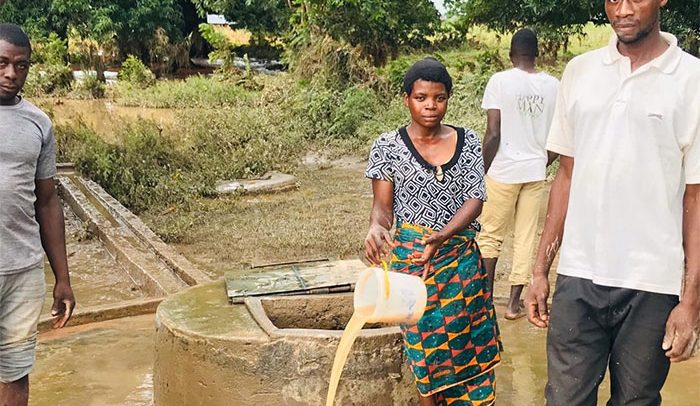Amama Sulley fetching the contaminated well water
Residents of Gaagbini and its surrounding communities in the West Mamprusi municipality have been compelled to drink unsafe water due to the pollution of the only source of potable well water in the area.
Floods in the North East Region submerged boreholes and wells, contaminating the water.
Amama Sulley, a resident, told DGN Online that the well was the only source of water to the people of the Gbaabini community and that other nearby communities depended on it.
According to her, the lack of access to potable water will greatly affect the communities as the only source of potable water has been contaminated.
“The well water does not dry up and it’s very helpful to us and the nearby communities during the dry season but now that it’s contaminated we don’t know what do.”
She said they are compelled to use the contaminated water for their household chores such as cooking, bathing, washing and other activities because they do not have any choice.
Amama therefore appealed to government and other institutions to come to their aid by providing them with potable water.
Another woman Latifa Tinyana from a different community called Gani in the West Mamprusi municipality which was hit by the floods resulting in the contamination of the only well in their community told DGN Online that they do not have pipes to get access to potable water and that the well was their only source of potable water until it got contaminated.
She revealed that they to drink from the contaminated well because they do not any other source of potable water.
“we use the water like that because we do not have any water around this community and moreover we do not any money to buy any chemicals to purify the water so we have no option than to use it for cooking, drinking and bathing even though we know it’s contaminated.”
Latifa appealed for support for the community to get access to potable water.
In 2010, the United Nations general assembly declared that human right to water entitles everyone to sufficient, safe, acceptable, physically accessible and affordable water for personal and domestic use. however, the reality is a contravention of the above.
In the North East Region scarcity of water has compelled communities to drink unclean and polluted water which is against the international human right.
NADMO Assessment Team Report
The assessment team made up of NADMO (Regional and District MMDA Level), Environmental Health (Regional and MMDA level), WFP, UNICEF, PLAN Ghana, Global Communities indicated in their report that boreholes and wells have been submerged by the flood and there is a possible contamination.
The report recommended that there is the need for disinfection of contaminated wells to provide good drinking water and to forestall outbreak of water borne diseases.
The Sustainable Development Goal
The Sustainable Development Goals (SDGs) VI, which Ghana is a signatory to, talks about ensuring available and sustainable management of water and sanitation for all.
The global effort to achieve sanitation and water for all by 2030 is extending beyond the household to include institutional settings, such as schools, healthcare facilities and workplaces.
This has been reinforced by global education for all strategies highlighting how water, sanitation and hygiene (WASH) in schools improves access to education and learning outcomes, particularly for girls, by providing a safe, inclusive and equitable learning environment for all.
Government’s Intervention
But data shows that the country’s progress towards achieving that goal is very slow, especially in rural communities.
In Ghana, close to six million people (nearly 22 per cent) rely on surface water to meet their daily water needs, leaving them vulnerable to water-related illness and disease, according to WaterAid, Ghana.
Further, 67 per cent of Ghanaians lack access to improved sanitation or are entirely without toilet facilities.
FROM Eric Kombat, Gaagbini

